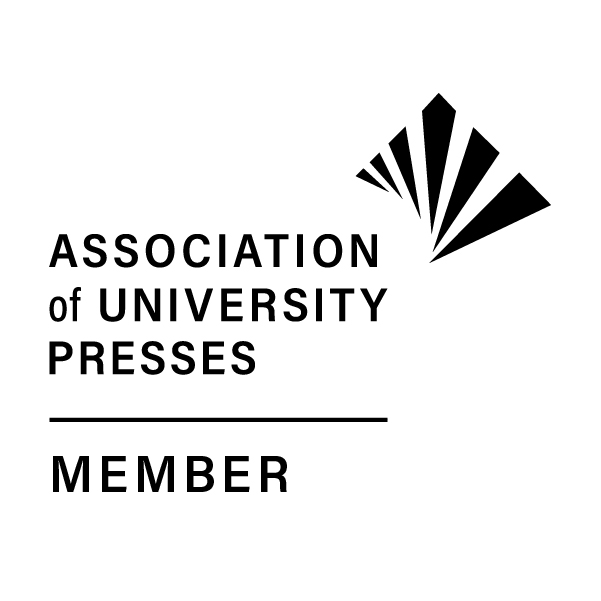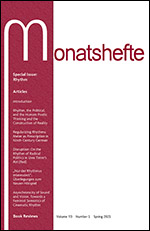|


|

Subscribe
Read the Journal Online
Submission Guidelines
Editorial Board
Receive Email Updates
Advertise in Monatshefte
Indexes/Abstracts
Current Issue TOC
Back Issues TOC
Monatshefte 2022 Subscription Rates
Institutions:
print & online $271
online only $233
Individuals:
print & online $103
online only $86
Non U.S. Postage (no postage charges for online-only subscriptions)
Airmail: add $40/yr.
Canadian Subscribers: add 5% GST. |
Monatshefte
Volume 92, Number 1, Spring 2000 Table of Contents
Texts and Documents
Siegrun Wildner
Interview mit dem österreichischen Schriftsteller Josef Haslinger
This interview with Josef Haslinger, Austrian fiction-writer and essayist, was conducted by Siegrun Wildner, Assistant Professor of German at the University of Northern Iowa, in the Spring of 1999. Haslinger was visiting Northern Iowa to read and discuss his works as part of the Meryl Norton Hearst Lecture Series “Language and Society.” Born in 1955, Haslinger long served as co-editor of the literary journal Wespennest (1976–1992), is known as a cofounder of the Austrian anti-racist movement SOS-Mitmensch (1992), and achieved international acclaim following the publication of his beststeller novel Opernball in 1995. He is currently Professor of Literary Aesthetics at the Deutsches Literaturinstitut in Leipzig. (CLN) (In German)
Articles
Ernest A. Menze
“Gang Gottes über die Nationen”: The Religious Roots of Herder’s Auch eine Philosophie Revisted
Abstract:
The richness and diversity of Herder’s mature thought were anticipated in the early essay on the philosophy of history that is the subject of this article. The challenge to the main currents of the century extended by Herder’s Auch eine Philosophie is often depicted as part of a temporary turn towards religiosity during the Bückeburg period of his life. This article interprets Herder’s “preliminary sketch” as representative of a continuum, reaching from the Christian commitment of the Riga pulpit of the 1760s to the Christian writings of the 1790s. Taking issue with the view that in this piece Herder, the enlightened Christian clergyman, struggled to distance himself from the strictures of religious certainties, the article seeks to show that Herder’s Bückeburg philosophy of history is based upon a deeply rooted faith, and that it sets the course for the Christian vision of world history which informs the mature works of the Weimar years. (EAM)
Arnd Bohm
The Tell-Tale Chalice: “Es war ein König in Thule” and Orlando Furioso
Abstract:
The recognition of Ariosto’s Orlando Furioso (1516) as as source for Goethe’s “Es war ein König in Thule” entails a re-interpretation of the poem’s meanings and of its function in Faust I. When read only as an evocation of ideal, undying love, Margarete’s performance of the song has been seen as an ironic counterpoint to her tragic relationship with Faust. But the intertextual information reveals the poem to be an indictment of men who mistrust women and thereby destroy ideal love, so that the poem reinforces the tragic plot of Faust I. (AB)
Martina Kolb
Gesine Cresspahls Mecklenburg-Manhattan-Transfer und seine Konsequenzen: Zwei un-heimliche Zeit-Räume in Uwe Johnsons psychologischen Romanwerk Jahrestage
Abstract:
Johnson’s novel confronts the reader with a continuous destabilization of identity, time, and space. His protagonist Gesine, however, is only understandable within the highly paradoxical framework of her very specific time-space, her transfer from past to present, from Mecklenburg to Manhattan. This time-space-continuum incessantly generates the uncanny as a result of Gesine’s acts of memory and perception, of her anxieties and desires. Her inner landscape repeatedly exhibits profound feelings of homelessness, of a “not here yet and not there any longer.” But her homelessness is twofold, her longing for “Heimat” doubly disappointed. Gesine’s life is located somewhere in between, and her alienation in Mecklenburg as well as in Manhattan, in German as well as in English, is written as an experience of unavoidable disintegration: “Heimat” remains utopian. (MK) (In German)
Carol Anne Costabile-Heming
Rezensur: A Case Study of Censorship and Programmatic Reception in the GDR
Abstract:
As an analysis of the details of literary production in the GDR, this article focuses on how censorship and programmed reception influenced the context of literature produced there and thereby informed our understanding of GDR literary history. The production histories of three texts by Günter Kunert (b. 1929) form the basis of this case study and illuminate how official and unofficial censoring procedures influenced the publication of Kunert’s texts. Ortsangaben (1971), Unterwegs nach Utopia (1980), and Die befleckte Empfängnis (1989) represent three different historical periods. The documentary evidence associated with these texts enriches our understanding of the control mechanisms in the GDR precisely because it permits us to trace the history of a text, allowing us thereby to re-contextualize GDR literary history. (CAC-H)
Paul O’Doherty
Die ‘Judenfrage’ in der DDR: Über die Diskrepanz zwischen Theorie und Praxis
Abstract:
In attempting to write the history of the GDR post-unification, some historians have engaged in undifferentiated criticism of all things East German. Where East German theory is seen as essentially ‘good,’ examples of divergent practice are easily found. But if the theory is ‘bad,’ then examples of divergent practice are frequently not even sought. This article looks at the discrepancy between theory and practice in the GDR in the 1950s with respect to the ‘Jewish Question’ in literature and culture. It responds to Thomas Jung’s assertion (see Monatshefte 90 [1998]: 49–70) that the ‘Jewish Question’ was essentially removed from literature and culture after the mid-1950s (until around 1970) by showing that the anti-Zionist theory and repression of the ‘Jewish Question’ in politics were only theoretical in the cultural sphere. The publishing practices of the time in the GDR in fact allowed relatively wide access to Jewish culture. Even Stalinism had its limits. (PO) (In German)
Thomas Jung
Wie war das nun mit Apitz, Seghers, Merker und den anderen? Wahrheitssuche zwischen Tendenzen und Pauschalurteilen oder eine kurze Replik auf eine Replik
Abstract:
Accepting O’Doherty’s criticism in most, yet certainly not all instances, I aim to present further new insights and recent publications on the topic. It must be acknowledged that—not only in the case of (literary) history—ever new perspectives on any subject will widen our horizon and reveal new facts to be added to our knowledge. But this is possible only in the context of an open academic exchange and fair dialogue. The dialogue presented in this journal could be one example of such a “work in progress.” (TJ) (In German)
Book Reviews
|

